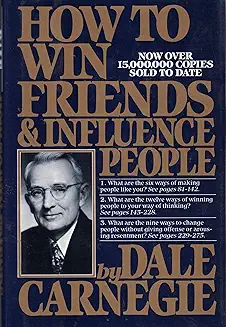by Dale Carnegie – Timeless Lessons on Human Connection
Introduction
Originally published in 1936, How to Win Friends and Influence People by Dale Carnegie is one of the most influential self-help books ever written. Despite being nearly a century old, its insights into human behavior, communication, and persuasion remain more relevant than ever—especially in today’s digital, distracted world.
This book is not about manipulation. It’s about building genuine relationships, improving social intelligence, and becoming the kind of person that others want to listen to, follow, and support.
Part 1: Fundamental Techniques in Handling People
Carnegie opens with three timeless rules that shape how people respond to you:
1. Don’t Criticize, Condemn or Complain
Criticism puts people on the defensive and damages relationships. Instead, understand before you judge.
2. Give Honest and Sincere Appreciation
Everyone craves recognition. Offering authentic praise builds trust and goodwill.
3. Arouse in the Other Person an Eager Want
Speak in terms of what they want—not what you want. This activates cooperation and interest.
“Talk to someone about themselves and they’ll listen for hours.”
Part 2: Six Ways to Make People Like You
Want to be likable? Carnegie says it’s not about charm, but attention and sincerity. His six rules:
1. Become Genuinely Interested in Other People
Ask questions, listen well, and remember what matters to them.
2. Smile
Simple but powerful. A warm smile conveys friendliness and openness.
3. Remember That a Person’s Name Is the Sweetest Sound
Use people’s names often—it shows respect and personal connection.
4. Be a Good Listener
Let others talk more. Show real curiosity about their lives.
5. Talk in Terms of the Other Person’s Interests
Find common ground and speak from their world, not yours.
6. Make the Other Person Feel Important—Sincerely
Show appreciation and acknowledge their worth with honesty.
Part 3: How to Win People to Your Way of Thinking
When you disagree, Carnegie teaches graceful persuasion rather than confrontation.
1. Avoid Arguments
Even if you “win,” the other person often resents you.
2. Show Respect for the Other Person’s Opinions
Never say “You’re wrong.” It kills openness.
3. If You’re Wrong, Admit It Quickly and Emphatically
This disarms criticism and builds trust.
4. Begin in a Friendly Way
Tone matters. Kindness opens doors that logic alone cannot.
5. Get the Other Person Saying “Yes” Immediately
Use small agreements to build toward bigger ones.
6. Let the Other Person Do a Great Deal of the Talking
People support what they help build.
7. Let the Other Person Feel the Idea Is Theirs
You can still guide the direction while letting them feel ownership.
8. Try Honestly to See Things from the Other Person’s Point of View
Empathy is the bridge to influence.
Part 4: Be a Leader – How to Change People Without Giving Offense
Want to correct someone without hurting them? Carnegie provides gentle leadership tools:
1. Begin with Praise and Honest Appreciation
Start positive, even when offering critique.
2. Call Attention to Mistakes Indirectly
Use phrases like “You might consider…” instead of blunt criticism.
3. Talk About Your Own Mistakes Before Criticizing Others
This levels the playing field and invites openness.
4. Ask Questions Instead of Giving Direct Orders
People prefer suggestions to commands.
5. Let the Other Person Save Face
Preserve their dignity even when they’re wrong.
6. Praise Every Improvement
Reinforce the behavior you want to see again.
7. Give the Other Person a Fine Reputation to Live Up To
Believe in their potential and speak to their better self.
Key Takeaways
- People respond emotionally, not logically. Connect first, then persuade.
- Appreciation beats manipulation. Flattery is fake; sincere praise changes hearts.
- Listening is more powerful than speaking.
- Winning people over is about mutual respect, empathy, and subtle influence—not control.
“You can make more friends in two months by becoming interested in other people than you can in two years by trying to get people interested in you.”
Final Thoughts: Become the Kind of Person People Want to Follow
How to Win Friends and Influence People is more than a social guide—it’s a blueprint for emotional intelligence, timeless leadership, and human connection.
Apply its principles in business, family, and friendships, and you’ll experience deeper trust, more opportunities, and authentic influence that lasts.



